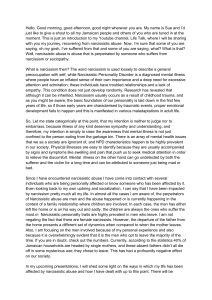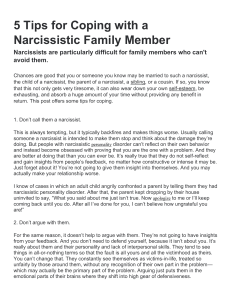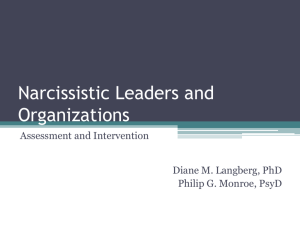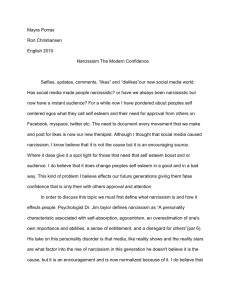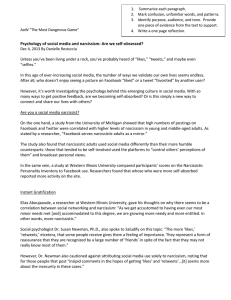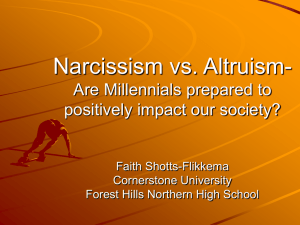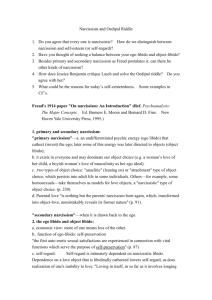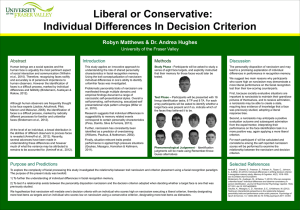Biblical Perspectives on Narcissistic Leadership
advertisement
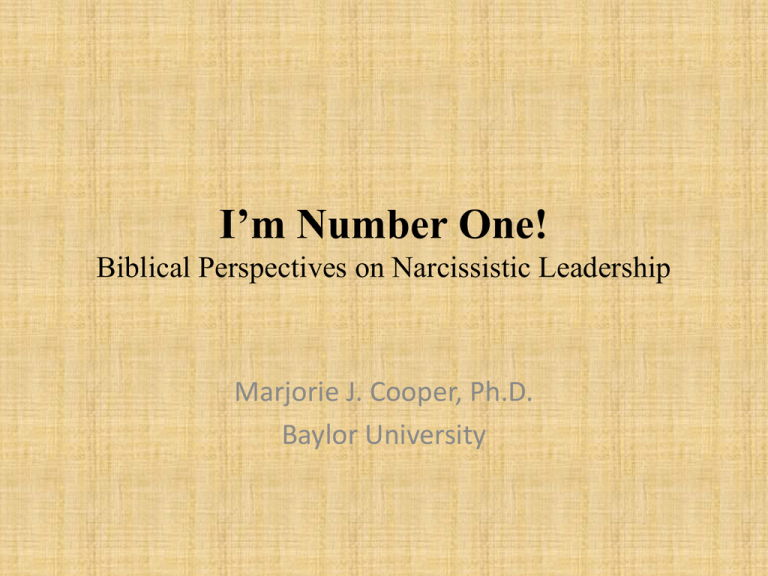
I’m Number One! Biblical Perspectives on Narcissistic Leadership Marjorie J. Cooper, Ph.D. Baylor University Should “we” . . . • • • • • Christians Business professors Business practitioners Citizens Human persons Celebrate narcissistic leadership? • • • • • • • • • • • Vision Energy Creativity Drive Motivation Charisma Star power Success Initiative Innovativeness Leadership potential • • • • • • • • Selfishness Greed Lust for power Insensitivity Ambition Grandiosity Ruthlessness Demands for unquestioned allegiance • Sense of entitlement • Lack of empathy • Arrogance DSM-IV Nine Characteristics of Narcissistic Personality Disorder (NPD) (Pick any five) • Exaggerated sense of self-importance • Fantasies of extraordinary success, power, brilliance, beauty, or ideal love • Belief that one is “special” and should only associate with and can only be understood by other high-status people • Demand for excessive admiration from others • A sense of entitlement DSM-IV Nine Characteristics of Narcissistic Personality Disorder (NPD) (Pick any five) • Objectification of others to achieve personal ends and gratification • Lack of empathy • Envy of others or belief that others are envious of oneself • Haughty, arrogant, patronizing, or contemptuous behaviors or attitudes toward others NPD is an Extreme • Narcissism is a continuum of a severity of symptoms • Narcissism also has various manifestations The First Narcissist • Ezekiel 28 • Isaiah 14 Four Motives • To take over the rule and worship belonging exclusively to Yahweh (Isa 14) • To induce Adam and Eve to appropriate his purpose rather than Yahweh’s purpose for them (Gen 3) • To induce Jesus Christ to worship him, thus reversing the order of creation (Matt 4; Mark 1; Luke 4) • To rule this world as God (Dan 11:36-37; 2 Thess 2:3-12) Some Ancient Narcissists • King Ahab (1 Kings 20-21) • Nebuchadnezzar (Dan 3-4) • Herod the Great (Matt 2) Discredited Narcissists in Our Day (some well-known ones) • • • • • Ken Lay of Enron* Bernie Ebbers of WorldCom* Dennis Kozlowski of Tyco* Mark Hurd of Hewlett Packard Ramalinga Raju of Satyam* *Rosenthal and Pittinsky 2006 Today’s Narcissists . . . • Have difficulty getting along with others • Fail to envision perspectives other than their own • Attack and abuse anyone who dares challenge them (Campbell et al. 2005) • Hold grudges, marking time until they can exact retribution (Downs 1997, 37-42) • Take more risks than others • Exhibit more uneven and unpredictable performance Today’s Narcissists . . . • Favor bold actions that attract attention to themselves (Chatterjee and Hambrick 2007) • Are the source of long-term problems and the proverbial “unintended consequences” (Campbell et al., 2005) • Do not wear well in the long-term, regardless of good first impressions (Paulhus 1998) • Say things like, “I don’t care how you do it; just see that you get it done” and then blame everyone else when “it” fails Today’s narcissists exhibit the following characteristics: • Inflated egos and extreme sensitivity to criticism (Downs 1997, 20-21) • High-maintenance, needing constant reassurance of superiority and unquestioning allegiance (Kets de Vries and Miller 1997, 194-214) • Ignore cautionary advice, prone to outbursts of anger (Capps 1993; Downs 1997) • The classic “empty self” Left in Their Wake . . . • Layoffs, leading to – Job loss and inability to support one’s family – Falsely inflated bottom lines – Long-term negative organizational effects – Loss of employee experience and expertise – Low morale on the part of employees who are left – Loss of business for the company Left in Their Wake . . . • The results of unethical behavior – They are often charismatic individuals who attract followers – They are prepared to take extreme measures to protect the appearance of superior performance – They will attack and get rid of any follower who endangers their position – “The rules don’t apply to me.” – They are highly self-protective How to catch them before you hire them • Question how others have contributed to the applicant’s success. • Look for exaggerated assessment of their past achievements. • Look for unrealistic and grandiose ambitions. • “Test drive” their interpersonal skills with people who can be of “no use” to them, people lower in the organization who cannot help them further their own interests. • Have them interviewed by someone who has the gift of discernment. How to catch them before you hire them • Is there evidence of the Fruit of the Spirit in their lives? Beware of being dazzled by the façade. • Evidence of long-standing spiritual mentoring and sustained Christian friendships? • Evidence of a personal love for Jesus Christ? • Able to recount instances of God’s discipline and how they corrected course as a result? What if you’ve already got one? • • • • • Pray Assess evidence of salvation Counsel from the Word Make use of the spiritual gifts of colleagues Cautiously: Consider guidelines for church discipline. They tell you what to do in the church as an organization. To what extent can they be applied to other Christian organizations? Does narcissism affect ethical sensitivity? (material not available in the paper) • Ethical scenarios – dependent variable • Religiosity - independent – Intrinsic – Extrinsic social – Extrinsic personal • Orthodox Beliefs - independent • Narcissism - independent Cluster Analysis Profiles (Means/Ordinal Placement) Religious Orientation Dimension: Cluster 1 (N=76) Cluster 2 (N=178) Cluster 3 (N=131) Int. Rel. Orientation -1.23 (Low) .08 (Moderate) Orthodoxy -1.78 (Low) .35 (Moderate) Ext. Rel. -.15 (Moderate) .58 (High) Orientation (Pers.) .89 (High) .56 (High) -1.00 (Low) Ext. Rel. Orientation (Soc.) -.26 (Low) -1.78 (Moderate) .14 (High) Effects for Cluster Membership on Ethical Tendency Mean Ethical Tendency Std. β (Narcissism) **p < .01, *p < .05 Cluster1 (N=76) .30 Cluster2 (N=178) -.02 Cluster3 (N=131) -.15 .12ns .320** .261** Effects of Narcissism on Ethical Tendency By Cluster Shall we discuss?


